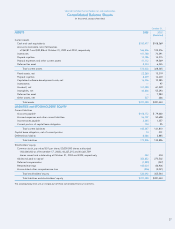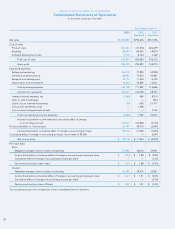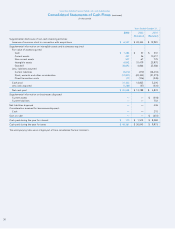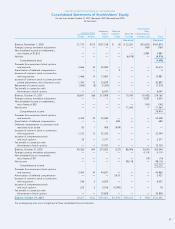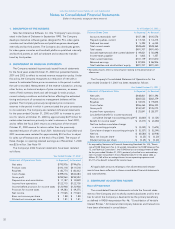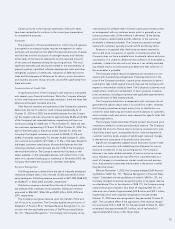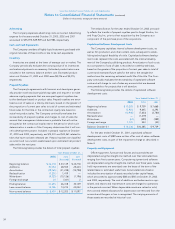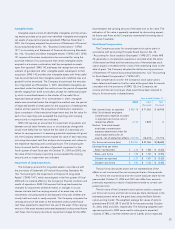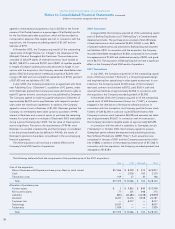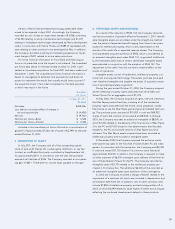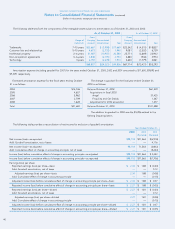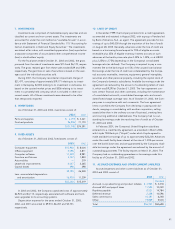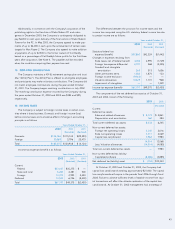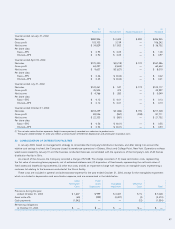2K Sports 2003 Annual Report Download - page 39
Download and view the complete annual report
Please find page 39 of the 2003 2K Sports annual report below. You can navigate through the pages in the report by either clicking on the pages listed below, or by using the keyword search tool below to find specific information within the annual report.
Under this pronouncement, the $1,948 net loss on extinguishment
of debt for the year ended October 31, 2001, previously classified as
an extraordinary item, has been reclassified as follows: $3,165 of loss
on extinguishment to non-operating expenses and $1,217 of tax ben-
efit to provision for income taxes. The adoption of SFAS 145 in fiscal
2003 did not have any impact on the Company’s financial condition,
cash flows and results of operations, other than the reclassification
referred to above.
In January 2002, the FASB issued Statement of Financial Account-
ing Standards No. 146, “Accounting for Costs Associated with Exit or
Disposal Activities” (“SFAS 146”). SFAS 146 requires the recognition
of such costs when they are incurred rather than at the date of a com-
mitment to an exit or disposal plan. The provisions of SFAS 146 are to
be applied prospectively to exit or disposal activities initiated after
December 31, 2002. The adoption of SFAS 146 in the first quarter of
fiscal 2003 did not have a material impact on the Company’s financial
condition and results of operations.
In December 2002, the FASB issued Statement of Financial
Accounting Standards No. 148, “Accounting for Stock-Based Com-
pensation—Transition and Disclosure” (“SFAS 148”). SFAS 148
amends the transition provisions of FASB No. 123, “Accounting for
Stock-Based Compensation” (“SFAS 123”), for entities that voluntarily
change to the fair value method of accounting for stock-based
employee compensation. The Company does not currently intend
to change its accounting to the fair value method. SFAS 148 also
amends the disclosure provisions of SFAS 123 to require prominent
disclosure about the effects on reported net income of an entity’s
accounting policy decisions with respect to stock-based employee
compensation, and amends APB Opinion No. 28, “Interim Financial
Reporting” to require disclosures about such effects in interim
financial information. The disclosure provisions of the amendments
to FASB 123 were adopted by the Company in the second quarter
of fiscal 2003.
In November 2002, the FASB issued Interpretation No. 45,
“Guarantor’s Accounting and Disclosure Requirements for Guaran-
tees, Including Indirect Guarantees of Indebtedness of Others” (“FIN
45”). FIN 45 expands previously issued accounting guidance and dis-
closure requirements for certain guarantees and requires recognition
of an initial liability for the fair value of an obligation assumed by issu-
ing a guarantee. The provision for initial recognition and measure-
ment of liability will be applied on a prospective basis to guarantees
issued or modified after December 31, 2002. The adoption of FIN 45
in the first quarter of fiscal 2003 did not have any impact on the Com-
pany’s financial condition or results of operations.
In January 2003, the FASB issued Interpretation No. 46, “Consoli-
dation of Variable Interest Entities” (“FIN 46”). FIN 46 requires a vari-
able interest entity to be consolidated by a company if that company
is subject to a majority of the risk of loss from the variable interest
entity’s activities or is entitled to receive a majority of the entity’s
residual return or both. FIN 46 also provides criteria for determining
whether an entity is a variable interest entity subject to consolidation.
FIN 46 requires immediate consolidation of variable interest entities
created after January 31, 2003. For variable interest entities created
prior to February 1, 2003, consolidation is required on July 1, 2003.
The adoption of FIN 46 in the third quarter of fiscal 2003 did not
have a material impact on the Company’s financial condition or results
of operations (see Note 4).
In April 2003, the FASB issued SFAS No. 149, “Amendment of
Statement 133 on Derivative Instruments and Hedging Activities”
(“SFAS 149”). SFAS 149 amends and clarifies financial accounting and
reporting for derivative instruments, including certain derivative
instruments embedded in other contracts and for hedging activities
under SFAS No. 133, “Accounting for Derivative Instruments and
Hedging Activities.” In general, SFAS 149 is effective for contracts
entered into or modified after June 30, 2003 and for hedging rela-
tionships designated after June 30, 2003. The adoption of SFAS 149
did not have any impact on the Company’s financial condition or
results of operations.
In May 2003, the FASB issued SFAS No. 150, “Accounting for
Certain Financial Instruments with Characteristics of both Liabilities
and Equity” (“SFAS 150”). SFAS 150 establishes standards for how
an issuer classifies and measures in its statement of financial position
certain financial instruments with characteristics of both liabilities
and equity. In accordance with SFAS 150, financial instruments that
embody obligations for the issuer are required to be classified as lia-
bilities. SFAS 150 is effective for financial instruments entered into or
modified after May 31, 2003, and otherwise shall be effective at the
beginning of the first interim period beginning after June 15, 2003,
except for the provisions relating to mandatorily redeemable financial
instruments which have been deferred indefinitely. The adoption of
SFAS 150 in the fourth quarter of fiscal 2003 did not have any impact
on the Company’s financial condition.
4. BUSINESS ACQUISITIONS AND CONSOLIDATION
The Company acquired seven companies that develop, publish or
distribute interactive software games during the three-year period
ended October 31, 2003. The aggregate purchase price, including
cash payments and issuance of its common stock, was $42,075,
$7,626 and $28,143 in 2003, 2002 and 2001, respectively. The value
of the Company’s common stock issued in connection with these
acquisitions has been based on the market price of the Company’s
common stock at the time such proposed transactions were agreed
and announced.
The acquisitions described below have been accounted for as
purchase transactions in accordance with APB No. 16 and SFAS 141
(for transactions after July 1, 2001) and, accordingly, the results of
operations and financial position of the acquired businesses are
included in the Company’s consolidated financial statements from
the respective dates of acquisition.
2003 Transactions
During the quarter ended July 31, 2003, the Company acquired
the assets of Frog City, Inc. (“Frog City”), the developer of Tropico 2:
Pirate Cove, and the outstanding membership interests of Cat Daddy
Games LLC (“Cat Daddy”), another development studio. The total
purchase price for both studios consisted of $757 in cash and $319 of
prepaid royalties previously advanced to Frog City. The Company also
37


